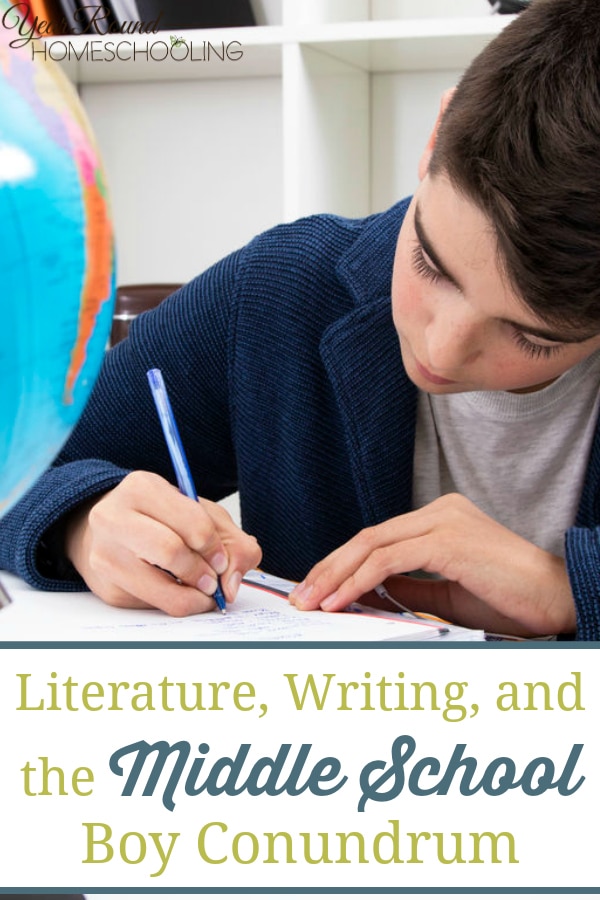If you’ve got a middle school boy in your homeschool, chances are your literature and writing lessons look like this:
You ask for an essay with five paragraphs. He hands you a stained, rumpled piece of looseleaf emblazoned with five sentences and “The End.”
Over dinner, you casually inquire how far he’s gotten in the latest book you assigned; he mumbles something and looks super interested in his peas. Later that night you find the novel shoved under the couch in the living room. No bookmark, no fingerprints. The spine is pristine and untouched.
On Tuesday he comes home from a field trip, his sweet face fairly sunkissed and happy. Wednesday morning you ask him to write about it. Half an hour later he gets up to use the bathroom; he’s written “It was fun” at the top of the page.

Teaching middle school literature and writing is daunting under the best of circumstances.
Add in a tween or early teen boy, and the stakes suddenly get much higher. What happened to the little boy who loved to sit and read on your lap? The creative mind whose complex storylines enveloped the play room with action figures and blocks? Shouldn’t that love of literature and writing carry over into the next stage of his life?
Sadly, the answer is not often. Losing oneself in literature and writing takes a backseat in the mind of middle school boys. They’re facing a new world of anxieties and pressures, of expectations and perceptions regarding what it means to be a man. It’s a painful space between childhood and adulthood, and it manifests anywhere it can.
The Barrier, Boys, and Middle School Writing and Literature
Your son’s approach to literature and writing doesn’t mean he lacks ability or skill. Rather, he’s put up a barrier to introspection and expression, two vital aspects of success in lit and comp. Breaking down that wall is key to moving beyond avoidance and bare bones responses, but how do we break through that adolescent noise to reach the brilliance inside?
Relevance
The first step toward reigniting the spark for literature and writing is to make it relevant to your son’s current time and space. What is he interested in? Does he have favorite sports or hobbies? Take these into account when choosing his reading material, consulting your local children’s librarian or sites like Guys Read for suggestions.
Now lest you think I’m advocating the desertion of classic literature, please rest assured that I’m not. High interest reading material is only the first step toward awakening that love of literature and composition, as it opens up the doorway to the greater literary canon. If your son has an interest in spaceflight, for example, start with graphic novels or nonfiction about space. This will open the door to titles like Ender’s Game and War of the Worlds, which in turn will provide fodder for advanced composition. Some of the best writers cut their teeth on modeling and imitation; who better to emulate than Wells or Card?
Connection
We know that boys need solid relationships, but how often do we consider how well friendships can facilitate an interest in reading and writing? If your son and his circle of friends see reading and writing as cool, they’re much more likely to take part in it at home.
To do this, try starting a book club or collaborative writing group. Ease into the process by having a based-on-the-book movie night, then read the novel to find out the differences between the book and film. Lead the group in a little reader’s theater, then expand it to their own film version as a group. Once reading and writing are a part of your son’s social circles, he’ll be one step closer to doing it on his own.
Purpose
The problem with instruction in reading and writing is that for most kids, it takes place in a vacuum. We’re a little less prone to that attitude as homeschoolers, but boys can still feel as though they’re writing for mama alone.
Our sons are going to need to read and write in the real world, so help them understand that now. Encourage letters to the editor for cases about which they are passionate. Submit to literary magazines both in print and online. If you’re comfortable with it, consider allowing him to join an online community like Bookopolis, where he can connect with other young readers, review books, and more.
Autonomy
Middle school boys crave ownership – the opportunity to have a say in what they learn and do. Why not let your son decide the number and type of writing assignments he will produce? Sure, the 5 paragraph is important, but what about the wide variety of genres and modes available? There is more than one way to express critical thinking. Let him figure that part out.
Adventure
Get outside. Seriously! Your son can and should experience the world around him and read books related to man’s desire for the wild. How do you do this? Visit places you’ve read about or go to author events at bookstores. Let your son immerse himself in the world of literature outside his door. There is one, and chances are, he’ll get a kick out of being a part of it.
In a way, it’s funny to think that some of the world’s greatest authors have been men.
I have to wonder if a twelve year old Mark Twain or Charles Dickens dragged his heels at the prospect of writing his letters. Your son may avoid literature and writing at all costs, but the potential for greatness lies inside him. Make it relevant. Forge connections. Let him lead you on grand adventures. Middle school boys can succeed in literature and writing.
Sometimes they just need a way out.
How do you keep your middle school son interested in literature and writing?
___________________________
 Ginny Kochis is a Catholic wife and homeschooling mom to three gifted and special needs kids. A former high school English teacher and Adjunct Professor of Developmental English, Ginny now teaches writing from home and blogs about faith, homeschooling, and gifted parenting at Not So Formulaic. You can find her on Facebook, Instagram, and Pinterest.
Ginny Kochis is a Catholic wife and homeschooling mom to three gifted and special needs kids. A former high school English teacher and Adjunct Professor of Developmental English, Ginny now teaches writing from home and blogs about faith, homeschooling, and gifted parenting at Not So Formulaic. You can find her on Facebook, Instagram, and Pinterest.
